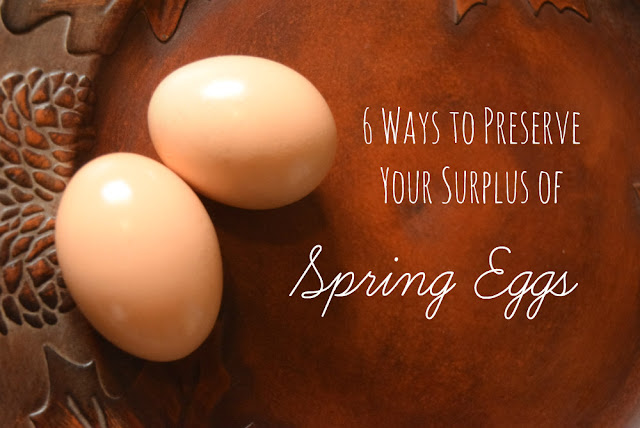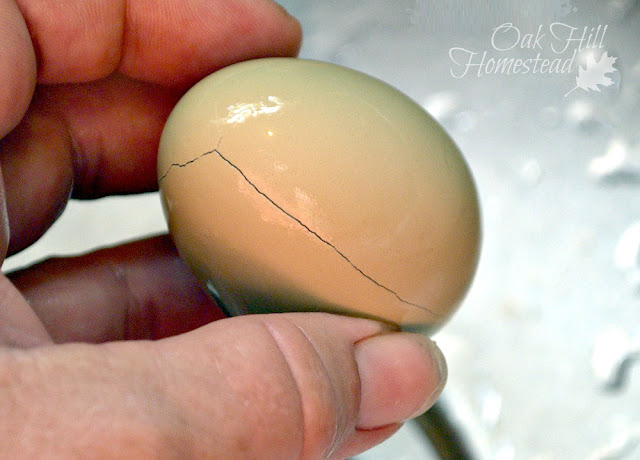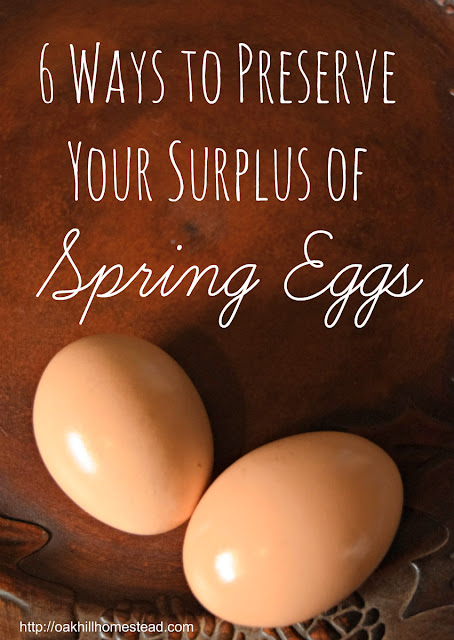Keeping farm fresh eggs longer is a crucial skill, whether you have backyard chickens or a homestead. These proven methods will help you extend the freshness of your eggs no matter where you live.
Learn how to check egg freshness, how to keep eggs fresh longer, and some simple ways to preserve eggs from your flock.
Updated August 2025
How to preserve fresh eggs
Spring on a homestead means an overabundance of eggs, and summer isn't far behind.
While my two-year-old hens took a break over the winter, the six young Rhode Island red pullets began laying in the fall and continued to supply us with eggs all winter long.
As soon as the days began to lengthen in spring, the older gals also resumed laying and soon we were overrun with eggs. Dozens more than we need!
And although I use a lot of eggs during the spring, I still have more than several dozen eggs in the refrigerator. Lots more.
Can eggs be preserved for later use?
Yes, they can! Let's explore several ways you can preserve eggs to use later.
But first, feel free to cook and bake with abandon, without worrying about how many eggs a dish requires. Spring is the time to splurge on recipes that include eggs.
You'll find more than 13 delicious ways to use extra eggs in this list of my favorite egg-heavy dishes.
How to check egg freshness
Before trying any of these methods of preserving eggs, do the "float test" to weed out the too-old eggs.
To check freshness of eggs in water, put the eggs one at a time in a deep pan of water. If an egg lays on the bottom of the pan it is a good, fresh egg.
If one end of the egg stands up in the water but the other end is still on the bottom of the pan, it's a good egg, just not as fresh.
If the egg floats on top of the water, get rid of it - very carefully! (Rotten eggs stink!)
How long do farm fresh eggs last
Eggs are laid with a natural coating on them which is called "bloom." The bloom seals the shells and keeps bacteria from entering the eggshell through the shell's pores.
As long as you don't wash the bloom off the eggs, they will keep quite well in the refrigerator.
Is it necessary to keep eggs in the refrigerator? Actually, no. You can keep them on the kitchen counter as long as you don't wash them.
They don't last as long on the counter as in the refrigerator, so plan to use these eggs first, before the ones in the fridge.
Of course, if an egg has a crack it should be discarded whether you keep them in the refrigerator or on the counter. Cracks allow bacteria to enter the egg.
The FDA says that fresh eggs should be used within 4-6 weeks if they are refrigerated. But honestly I don't pay much attention to the dates.
I use the oldest eggs first, and if I think they might be too old, I test if the eggs are fresh using the float-in-water test above. Of course if they flunk the test, we don't use them.
By the way, if I'm selling eggs from my flock, I only sell the newest, freshest, refrigerated eggs!
Eggs that you buy at the grocery store are probably already 4-6 weeks old when you bring them home. We all know from experience that store-bought eggs will keep quite awhile in our home refrigerator. The FDA says to use eggs from the grocery store within 3-4 weeks of purchase.
For this reason, I feel that I can safely refrigerate farm fresh eggs for 4 weeks longer than store-bought eggs.
Storing eggs long term
The methods that I'm sharing here are meant to store eggs for longer periods of time, but if you wish to store eggs long term I suggest buying freeze-dried eggs (unless you're blessed to have a home freeze dryer), or preserving them with lime, which is also called "water glassing." You'll find information below.
However, the methods discussed below will definitely prolong the life of your refrigerated eggs. Which one will you try?
Pickled eggs
Making pickled eggs was the first preservation method I researched. At the time, there wasn’t much information about it. These days, you’ll find it’s a much more popular topic.
We’re not huge fans of pickled eggs here at our house, but every so often I’ll make a batch for variety. The process is similar to pickling vegetables: you hard-boil the eggs, peel them, and store them in a seasoned vinegar brine for several days to let the flavor develop. They’re usually stored in the refrigerator and enjoyed within a few weeks.
If you’d like detailed step-by-step instructions, here’s a trusted resource I recommend: Pickled Eggs Guide from Healing Harvest Homestead.
Can you dehydrate eggs?
I’ve been told more than once that it isn’t considered safe to dehydrate eggs at home. The concern is that the temperature may not get high enough to kill bacteria like salmonella. Raw eggs have a bit of a reputation for causing foodborne illness.
That said… I do occasionally eat raw cookie dough. (Don’t judge me!)
Out of curiosity, I decided to try dehydrating eggs anyway. I whisked up half a dozen fresh eggs and poured them onto a plastic dehydrator sheet, the kind usually used for fruit leather.
It took hours and hours for them to dry, and even then, the result was greasy, unappealing, and left me wondering if they were truly dry enough to store safely. In the end, I couldn’t bring myself to eat them or store them.
I recommend freeze-drying them instead of dehydrating - if you're lucky enough to own a freezer-dryer. Otherwise, I'd purchase freeze-dried eggs from a reputable company such as Augason Farms on Amazon, or on their website, or from 4Patriots.com.
How to freeze eggs
Freezing eggs is an easy way to preserve them for use later.
I used to use ice cube trays for this but one egg takes more than one "cube" of space. That made figuring out how many cubes I'd need for a recipe calling for two eggs a bit of a guess.
So I began using my silicon cupcake liners, set inside a cupcake baking pan so they would hold their shape better. This is a much better method. And even better is using a one-piece silicon baking mold with larger cavities.
You have the choice of freezing the eggs well-beaten or simply cracking an egg into the cavity and freezing it unbeaten. The choice is up to you; they seem to do well either way.
Simply set the full silicon baking molds or ice cube tray in the freezer until the eggs are frozen.
Then pop the frozen eggs out of the molds and put them in a zipper-topped bag, and put the bag back in the freezer to store.
Frozen eggs can be stored for approximately one year.
When ready to use them, let the frozen egg thaw in the refrigerator overnight and then add to your recipe, or use them to make an omelet or scrambled eggs.
How to freeze whole eggs
You can also freeze whole eggs. Simply place washed eggs in zip-top bags, label them with the date and put them right in the freezer.
When you need an egg or two, remove them from the freezer, run them under warm water, remove the shells and place the eggs in a bowl to thaw.
It usually takes 15-30 minutes to thaw a whole, frozen egg on the counter, or a couple of hours in the refrigerator.
The first time I froze eggs whole, I was convinced that the eggs would crack in the freezer, make a mess and be unusable, but I could spare a few considering I was overrun with eggs.
So I washed half a dozen eggs and put them in the freezer in a zip-top bag, labeled with the date.
The next day I checked them out. Yes, they had cracked, but evidently the egg inside was already frozen when that happened so there was no mess.
It was easy to peel the shell from one of the eggs after letting hot tap water run over it for a few minutes. (It's a strange feeling to hold a shell-less, raw egg in your hand, still holding its frozen whole-egg shape.)
I put the egg in a bowl and stuck it in the refrigerator to thaw completely. By the next morning it was thawed and ready to use. The yolk stood tall just like a fresh egg should.
If you have room in your freezer, this is a viable method of preserving eggs. It's definitely the quickest and simplest way to freeze eggs.
Preserve eggs with mineral oil or olive oil
This quick, easy and simple method has become my go-to way to keep eggs fresh longer in the refrigerator. Of course, you're still limited by the amount of space you have in the fridge.
While most directions I've found suggest using mineral oil, I use olive oil instead. The directions are the same, no matter which kind of oil you use.
Pour a small amount of the oil in your palm and roll a unwashed, dry egg around in your hand until it's completely coated with the oil. Set the egg on a kitchen towel while you coat the rest of the day's eggs - don't set them back in an egg carton yet, as the oil will make them stick to the carton.
Then "polish" the eggs with another clean towel to remove excess oil. The oil seals the pores in the eggshells and keeps air and bacteria from penetrating the shells, keeping the eggs fresh longer.
Store these coated eggs in cartons in the refrigerator. Make sure each egg is dry before placing in an egg carton, so they won't stick to the carton's sides.
These eggs last several months in the refrigerator. Since I use eggs sparingly during the winter, I usually have enough preserved-in-the-fall eggs to get us through till spring.
Water glassing eggs
Water-glassing is an old-fashioned way to preserve fresh eggs for months without refrigeration. It works by submerging clean, unwashed eggs in a solution of pickling lime (calcium hydroxide) and water, which seals the pores in the eggshell and prevents air and bacteria from getting inside.
This uses the same principle as the method above, where mineral oil or olive oil also seals the pores in the eggshells.
This method is popular with folks who want to store a large number of eggs through the winter, and many claim that properly water-glassed eggs taste almost as fresh as the day they were laid, even after several months.
For more information
If you're interested in having chickens in your backyard so you'll have a surplus of eggs, check out all of my chicken-keeping posts here.

















